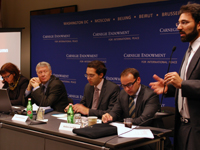Registration
Thank you!
You will receive an email confirming your registration.
IMGXYZ3279IMGZYXSince the controversial December 2010 election, Aleksandr Lukashenka’s regime has become increasingly isolated and Belarus remains in a state of economic and political crisis. To mark twenty years of Belarusian independence, Carnegie hosted two panel sessions that assessed popular attitudes towards the Lukashenka regime, Belarus’s economy, and Belarus’s relations with the United States, European Union, and Russia. Balázs Jarábik from Pact, Inc. and Carnegie’s Matthew Rojansky moderated the panels.
Belarus Today
- Public Opinion: Popular support for the Lukashenka regime is waning, argued Oleg Manaev from the Minsk-based Independent Institute of Socio-Economic and Political Studies. Recent opinion polls show that ordinary people believe the economic situation is deteriorating and think Belarus is heading in the wrong direction, he said. Far fewer respondents said they would vote for Lukashenka in the next election and more people have begun to identify with the political opposition. A sense of gloom hangs over Belarusian society as trust in political leaders continues to fade, Manaev concluded.
- Economic Woes: As a result of national currency devaluation, Belarusians are now three times poorer than they were before, noted Daniel Krutzinna from Uniter Bank. Minsk’s attempt to develop a multi-vector economic policy, in which Belarus would seek investment from Russia and the West and thereby diversify its risk, failed. The International Monetary Fund refuses to assist Belarus unless Lukashenka begins to implement serious domestic reform, but reform efforts have been half-hearted at best, he said. However, he added, despite high inflation and growing debt, the macroeconomic situation is relatively stable.
- Ecotourism: Outside Minsk, Belarusians still have a rural mentality, argued Valeria Klitsounova from the Association for Rural and Ecotourism. Her organization aims to support village life through ecotourism initiatives, such as bed and breakfast homestays. Indeed, with 10,000 lakes and 20,000 rivers, she suggested that Belarus has the potential to become a major ecotourism destination.
- Role of Youth: Belarus’s post-Soviet generation has developed a national consciousness, Klitsounova argued. Young Belarusians are more oriented towards the West and “accept Russians as foreigners.” Unlike the older generation, young people are capable of understanding and supporting democracy and the creation of a market economy, she added.
- Opposition and Civil Society: The idea of a united Belarusian opposition is a myth, argued Manaev. Meanwhile, civil society can only function in certain social and cultural lacunae as long as no one directly challenges the regime, he said. Non-governmental organizations in Belarus are operating like secret societies, Jarábik argued.
- Internal Disagreement: Krutzinna and Manaev both noted that there is discontent within the ruling government. Behind closed doors, government officials acknowledge mistakes and realize that the situation could be better. Panelists spoke about the possibility of a major split within the government, but only a trigger event would likely create such internal upheaval. In the end, there may be no united opposition, but there is no united regime either, Jarábik concluded.
Belarus and the Outside World
- Relations with the United States: In the early 1990s, U.S.-Belarus relations looked promising, said Baxter Hunt from the U.S. Department of State. Since Lukashenka’s ascension to power in 1994, however, Belarus’s relations with the United States have deteriorated significantly. In 1997, the U.S. downgraded its diplomatic relations with Belarus to the level of “selective engagement” and refocused its efforts on civil society. In March 2008, the United States recalled its last ambassador in Minsk. Tellingly, only five U.S. diplomats are working in Belarus today. He explained that support for human rights and humanitarian assistance will remain at the top of the U.S. agenda for Belarus.
- Relations with the European Union: When it comes to engaging Belarus, the European Union is short on carrots and sticks, argued Mitchell Orenstein from Johns Hopkins SAIS. The “carrot of EU membership” has traditionally served as Brussels’s chief foreign policy tool, but Lukashenka is not interested in pursuing reform in order to join the European Union, he said. Although some EU leaders have called for new incentives, the European Union cannot foster political change in Belarus from the outside through incentives or sanctions. Jarábik added that while progress is being made, the EU is disproportionately focused on elites rather than Belarusian society.
- Relations with Russia: Alexei Pikulik from the Belarusian Institute for Strategic Studies described Belarus as a rentier-state that obtains external rents (oil and gas revenues) from Russia. Belarus is gradually shifting from an inclusive to an exclusive autocracy in which rents only benefit a small group of elites. He dispelled myths about Russian ambitions in Belarus, arguing that Russia does not want to annex or privatize Belarus and does not regard Belarus’s dialogue with the West as an existential threat. While the next Russian president is likely to exert more pressure on Lukashenka, Belarus is a key partner in Vladimir Putin’s Eurasian Union project. Russia is also using Belarus as an off-shore zone for gambling, banking, and oil trading, he added.
